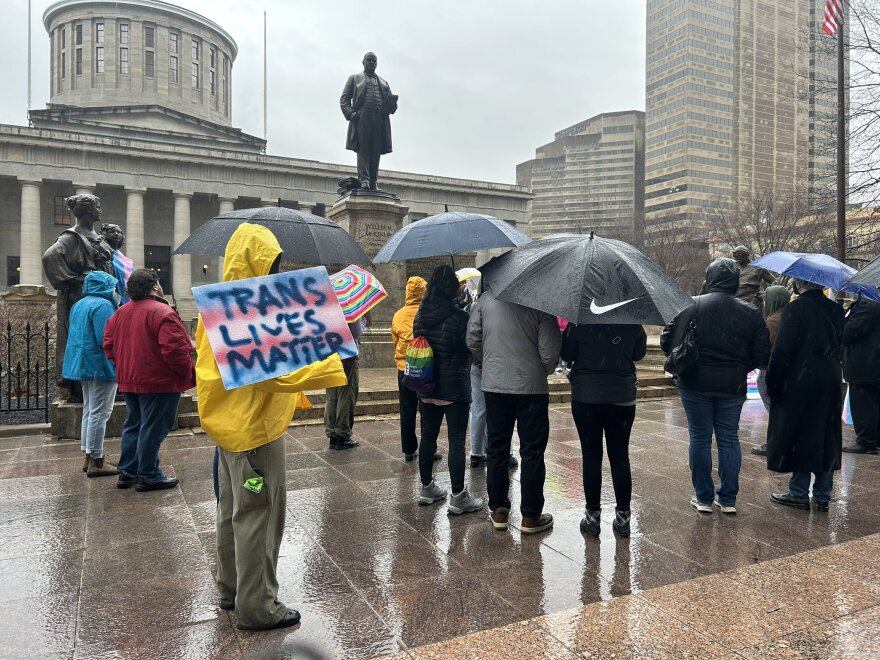On Jan. 24, The Ohio House of Representatives overturned Governor Mike DeWine’s veto on House Bill 68. This bill is an effective ban on all gender-affirming care for minors in Ohio, and bans minors living in Ohio from receiving trans care across state lines. Obies should note that this bill prevents transgender women from participating in women’s sports at all levels of education. This is all to go into effect April 24.
While DeWine vetoed HB 68, he created his own executive order. In its original draft, the executive order would have required all minors and adults in Ohio to have, at minimum, an endocrinologist, a psychiatrist, and a bioethicist on their care team in order to receive gender affirming care. Any health agency that did not have all three on staff, which would be most small and mid-sized providers, would not be able to treat trans patients.
The executive order was opened to public comments, and the newest draft does not apply to transgender adults and does not require a bioethicist for minors, keeping trans care very similar to how it already was in Ohio. DeWine’s executive order now stands in opposition to HB 68.
These laws do not come from nowhere. In fact, they come from a nationwide swell of anti trans legislation. In 2023, 17 states passed legislation restricting transgender care for minors in some way. Three had done so before then. Florida is the only state to have legislation limiting transgender care for adults.
As a trans man, I didn’t know about HB 68 until the veto and the executive order on it had been overruled. I’ve noticed stunningly little awareness of the anti-trans legislation in Ohio, both on Oberlin’s campus and from most of my trans friends back home. This isn’t for lack of reporting, since most major news sources are covering these laws. Rather, it seems that transgender legislation suffers from the same prognosis as issues like police brutality, deportation, and abortion: there is just too much bad stuff happening for us to keep track of it all.
In politics, apathy and fear are the same beast. When people exist in a place so hostile to their identity, and in a place without publicized advocacy for their existence, it can feel paralyzing. This paralysis then leads to compartmentalization. I find this phenomenon to especially be the case with Obies, who often come to Oberlin from out of state, specifically Democratic states. Many of us from blue states tend toward apathy when it comes to Ohio legislation for two reasons: we can always get our care from home, and we have been taught by a common liberal attitude that all Republicans are crazy and red states are a lost cause.
When I hear Obies talk about Ohio, they portray it as a fallen hero, a blue state turned red, never to be recovered. It’s a place we go to get our education and get out. However, Ohio is full of transgender people — 0. 51% of the adult population, as opposed to the national average of 0.50% — , it is a state that voted to protect reproductive healthcare, and it is where we’re going to spend at least four to five years of our lives.
There is still more anti-trans legislation that would have a direct effect on Obies that is currently being considered. House Bill 183, which has been in the House committee since June, would force all levels of education, including Oberlin, to have assigned sex bathrooms, making multi-stall gender neutral bathrooms virtually impossible. Senate Bill 83, which is currently waiting to be passed by the House, would pull government funding from any college with programs that fall under Diversity, Equity, and Inclusion.
This is where the fear comes in. A lot of Obies don’t pay attention to trans laws because it feels like, even if they did, it wouldn’t matter. On a campus that is so isolated from the rest of the state, it can feel like there is no one out there defending trans rights, as if transgender Ohioans have been abandoned. But there is hope.
The ACLU is currently preparing a lawsuit challenging a provision in HB 68 that prevents trans care for minors. They hope their lawsuit will delay the enactment of the law. TransOhio is an important statewide organization that provides telephone support through their Trans Care Connect Warm Line, legal support, and emergency funds to those in need of trans care. The Ohio Students Association is a statewide activist group of college students who unite on leftist issues, including transgender rights.
More anti-trans legislation is going to be brought to the table in the coming years and, without vigilance, will pass without us noticing just like HB 68. The first step to engagement is being able to have these difficult conversations, and in order to do that, we have to be able to maintain hope. So, I encourage trans students at Oberlin, please take care of yourself, please celebrate yourself, and please talk about House Bill 68.
There will be hearings on March 18 and 21 on transgender laws in Ohio to hear public comments. If you would like to submit a written testimony, which would be heard in these hearings and could affect the interpretation of these laws, please email [email protected] by 5 p.m. On March 18 or [email protected] with the subject line “TESTIFYING IN PUBLIC HEARING MARCH 21” before March 21. Your voice could make a difference.



